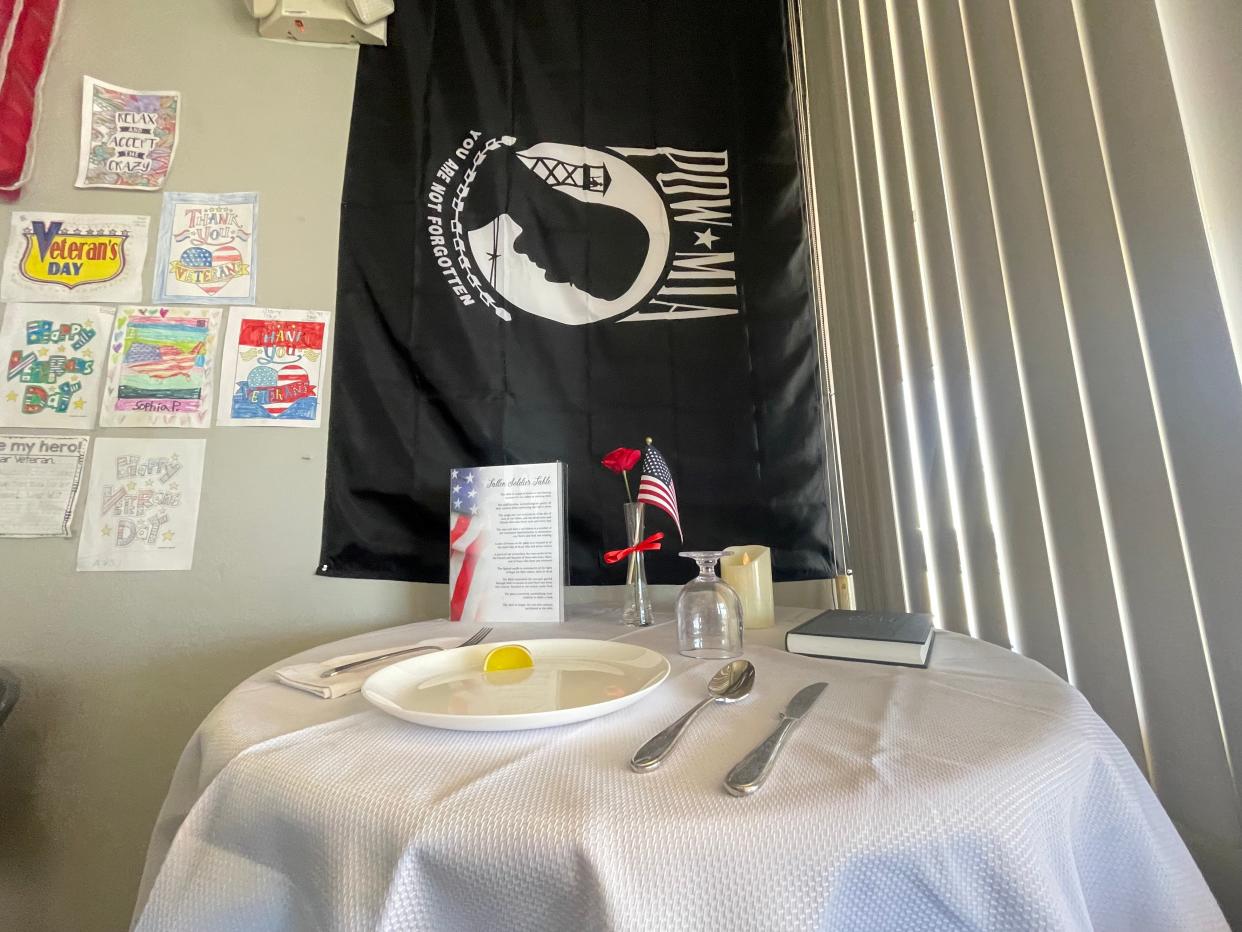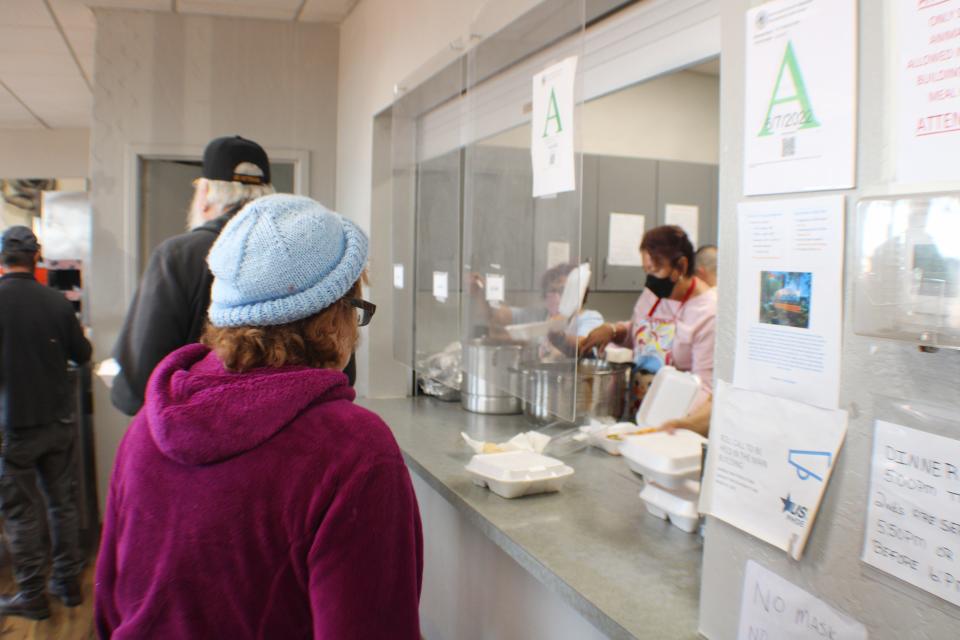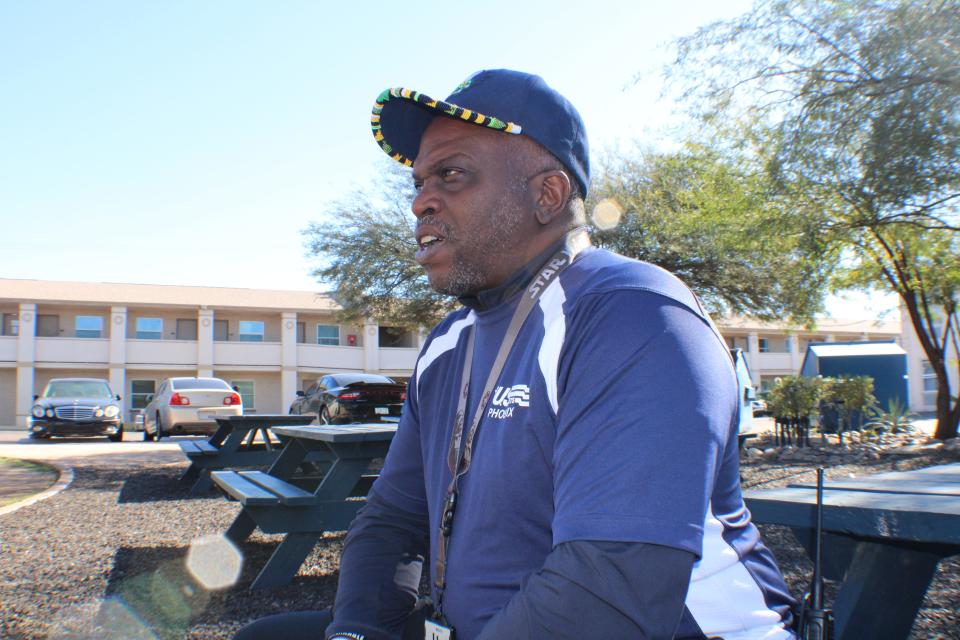Season for Sharing helps U.S. Vets feed veterans in 1st step to finding independence

Being a veteran means being a part of a family made up of people from all walks of life who will offer each other a hand when one of their own needs one.
That kind of support comes in all shapes and sizes, depending on the person’s needs. At U.S. Vets, a nonprofit organization centered on assisting veterans, that support focuses on getting people back on their feet and letting them maintain their independence.
According to Matthew Phillips, executive director of the Prescott branch, getting someone on that journey starts with providing the essentials: food, shelter and camaraderie.
“Depending on where they’ve come from their situation, we want to make sure that when they get here, one of the first things that we do is we provide them a nutritious balanced meal, so that we have that foundation underneath them, so they don’t have to be concerned about where’s your next meal coming from,” Phillips said.
Through its meals program, the group provides three free meals to vets daily, creating some much-needed stability. The program is partially funded at both the Phoenix and the Prescott U.S. Vets locations by The Arizona Republic’s Seasons for Sharing grant.
With the help of Republic readers, Season for Sharing has raised and given away almost $72 million to Arizona nonprofits since 1993. Last year, both the Phoenix and Prescott locations of U.S. Vets won a grant from The Arizona Republic's Season for Sharing campaign, which distributed $1.8 million among 164 nonprofit organizations across the state and which was made possible by donations from Arizonans.
Collectively, the organization houses more than 13,400 veterans per year and provides meals for all of them, whether at a chow hall or delivering the meals to wherever they may be.

Michael Biggs, U.S. Navy veteran and program director, first got involved with U.S. Vets in 2011 when he met two Army veterans while he was living with his sister in Phoenix and going for a run.
”They said, ‘Hey, you’re a homeless veteran?’ and, I’m like, 'I’m not homeless, like I live with my sister,' and they’re like, 'Well, is your name on a lease?’ I said, ‘No’. ‘Then you need to come with us,’” Biggs explained.
The two veterans introduced him to U.S. Vets and its housing program, which provides veterans with on-site housing and connects them to financial resources available.
Biggs moved in soon after. He shared a place with six others and was able to save money on fundamentals and rent costs so that eight months after getting there he was able to move into his own place.
“I was working at the time, and that's how I saved my money to be able to move out. So you know, they gave me a place to stay," Biggs said.
The same happened for Charles Eacock, an active-duty guardsman who lives at the Phoenix location after he was priced out of his home during the pandemic.
He explained that a new owner had bought his building and more than doubled the lease deposit.
”And so basically, I was put out on the street and I was out on the street for about three months living in truck stops,” he said.
After about three months, he found U.S. Vets, “and within a week, I end up moving into the U.S. Vets facility that I’m at now, and when I first got there, I pretty much had everything I needed.”
Jennifer Gewarges, executive director for the Phoenix branch, explained that once they provide stability to their patrons, they assist veterans with whatever their individualized needs are.
“That means meeting the veteran where they’re at. So if they’re currently experiencing homelessness, if they’re living in their cars, if they’re going from home to home and assessing their mental health, their needs, and their goals,” she said.
The group assists with health care needs, finances, career services and housing. And supporting those folks who have found housing by helping them maintain that newfound stability, whether that means eviction prevention, car repair, or even helping them find furnishings, Gewarges said.
Eacock said that after he had moved in, they began to work on getting closer to his goals of owning a house and paying off his debt. He was able to get a driver’s license, take care of his legal issues, and pay off most of the debt he had built up as an adult.
The programs focus on providing assistance, not forcing “help.” Biggs said that veterans sometimes have issues with taking help, but when it’s framed as assistance, it's easier to accept, he said: “I'm not gonna take in help, no, but I'll take assistance.”
He said that feeling self-empowered creates more stable foundations, especially for folks who have never been taught how to live independently.
Getting the basics taken care of so he could focus on saving was essential, he said.
“I didn’t have to pay for meals, I didn’t have to plan for breakfast, lunch or dinner,” he said, “And even if I wasn’t on site, I could take breakfast and lunch to work and they could set dinner aside for me, I didn’t have to worry about trying to conform to the time constraints of being here to be able to eat.”

Another part of those essential needs provided was community, Biggs said.
“The two guys that brought me on the program were in my six-man room with me. It’s crazy that I still speak to them 10 years later, they’re still my boys,” he said, “We worked as a team and that helped. It helped with like, isolation. It was great to be around our brothers and sisters and also to know you’re not the only one.”
U.S. Vets Phoenix funds most of these programs through the Veterans Affairs, but it still needs support and donations from the community. The Phoenix branch will move its residents to a new location, which means getting volunteers to help with packing and asking for donated furniture.
”We do a lot of fundraising, a lot of outreach for donations, because that will help us be able to purchase the needs for the veterans. And then also we take donations for hygiene items, which is one of the biggest items that we need a lot of,” Gewarges said.
People looking to donate time, funds or goods can do that in person at the Phoenix location at 3400 Grand Ave. or online.
How to donate to Season for Sharing
With the help of Republic readers, Season for Sharing has raised and given away almost $72 million to Arizona nonprofits since 1993.
Ways to give
Fill out the secure, online form at sharing.azcentral.com.
Text “SHARING” to 91-999 and click on the link in the text message.
Go online at facebook.com/seasonforsharing and look for the “DONATE HERE” post.
Clip the coupon on Page 4A of The Arizona Republic, fill it out and mail it to P.O. Box 29250, Phoenix AZ 85038-9250.
Make a donation when you buy tickets to Las Noches de las Luminarias at Desert Botanical Garden. dbg.org.
Where does the money go?
When you give to Season for Sharing, you are helping nonprofits that support education, feed the hungry and help struggling families and older adults. The Republic pays all administrative costs, so 100% of donations go back to the community.
This article originally appeared on Arizona Republic: Season for Sharing helps U.S. Vets feed veterans in Arizona

